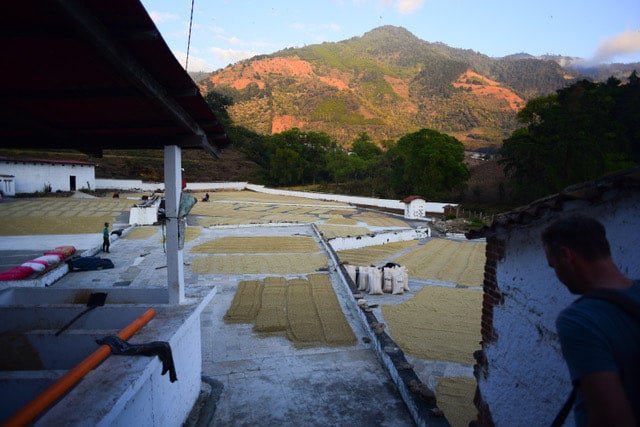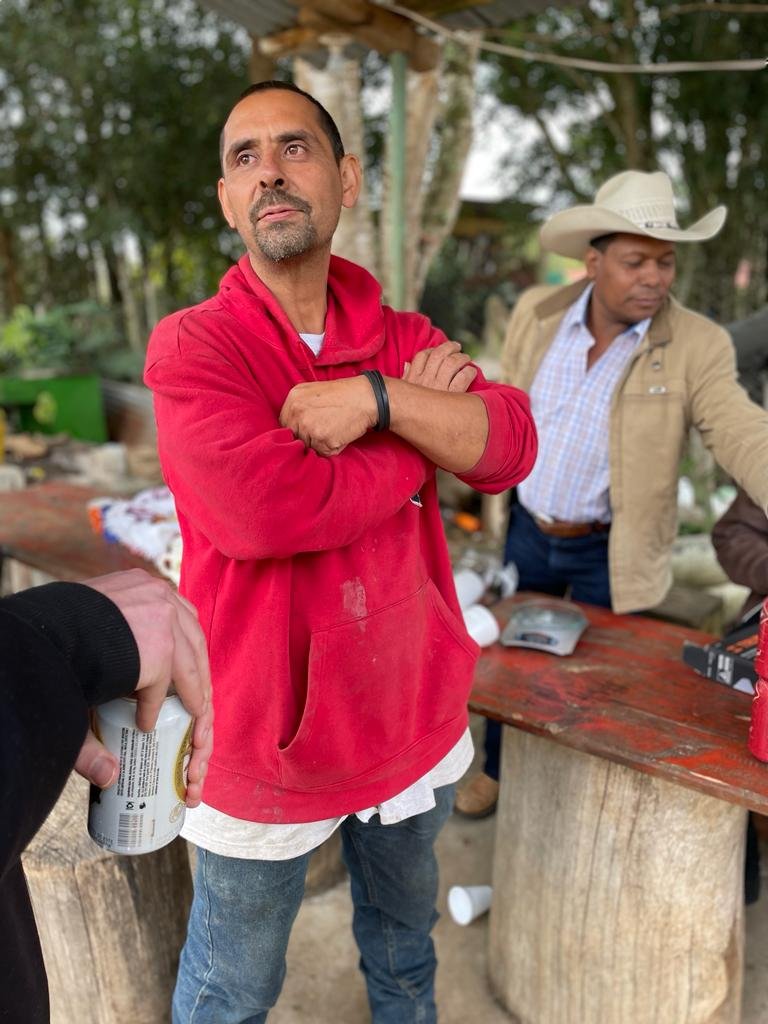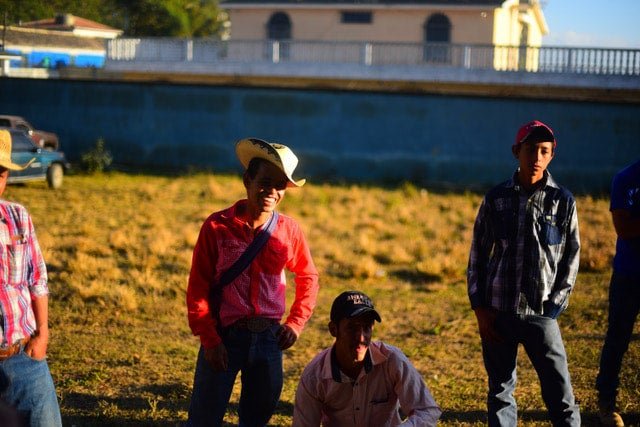 Image 1 of 4
Image 1 of 4

 Image 2 of 4
Image 2 of 4

 Image 3 of 4
Image 3 of 4

 Image 4 of 4
Image 4 of 4





Abel Ortiz "Cafe Colis Resistencia"
Country: Guatemala
Producer: Abel Ortiz
Varieties: Pacas and Pache San Ramon
Farm name: El Aguacate
Farm size: 2 hectare
Location: El Escobal, San Miguel, Mataquescuintla, Jalapa
Altitude: 1650masl
Process: Washed
Roast Level: Medium
Tasting Notes: Ferrero rocher, hazelnuts, baked red apple, balanced, sweet
In 1967 Abel Ortiz's grandfather Felipe planted the first coffee variety on the farm. It was the Bourbon variety and in 1987 his father planted another variety; Pache San Ramon. Since that time Abel has been able to consistently keep a good crop of that variety. He is one of the original members of the Cafe Colis Resistencia group, having worked to see his coffee exported to Canada since 2019. As a third-generation coffee grower, he’s been managing his own farm since 2000. Abel lives and grows coffee in the El Escobal township, which is to the north of Mataquescuintla proper. Here, he is part of the Xinka delegation that has been very united in the coffee growing side and has been working diligently on their post-harvest processing methods to improve the quality of their coffee.
Quietly Built, Loudly Opposed
For the Indigenous Xinca, the Escobal silver mine looms in the background, both figuratively and literally. Owned and operated by the Canadian-based Pan-American Silver, it’s estimated to be the second-largest silver mine in the world, and was built without the consultation nor the consent of the local people, in direct contravention of the United Nations Declaration on the Rights of Indigenous Peoples (UNDRIP). Yet, at this moment, it sits shuttered, license temporarily suspended thanks to the organized actions of the Xinca people, who claim a long and storied history of resistance to colonization and infringement in their territories that dates back to the Conquest of Latin America. Canadian involvement in extractive projects in this area is well-documented and goes back at a minimum two decades. Escobal specifically was conceived in the late 2000s, and its potential existence was met by a series of local plebiscites and referendums held through 2011 and 2012. Due to its size, the profit a company stands to gain through this project is enormous, yet all the risk remains on the local people who must live with the guaranteed detrimental effects on the wellbeing of their families and the natural environment that sustains them. It makes sense then why all of these multiple plebiscites reported at minimum 93% opposition to the project by the local population. In the municipality where the mine was eventually built, San Rafael Las Flores, the plebiscite was blocked by municipal authorities, figures who have now been exposed as recipients of benefits from Esobal and its local subsidiary, Minera San Rafeal.
We feel honored to be able to share this coffee with you in support of such a meaningful project.
Country: Guatemala
Producer: Abel Ortiz
Varieties: Pacas and Pache San Ramon
Farm name: El Aguacate
Farm size: 2 hectare
Location: El Escobal, San Miguel, Mataquescuintla, Jalapa
Altitude: 1650masl
Process: Washed
Roast Level: Medium
Tasting Notes: Ferrero rocher, hazelnuts, baked red apple, balanced, sweet
In 1967 Abel Ortiz's grandfather Felipe planted the first coffee variety on the farm. It was the Bourbon variety and in 1987 his father planted another variety; Pache San Ramon. Since that time Abel has been able to consistently keep a good crop of that variety. He is one of the original members of the Cafe Colis Resistencia group, having worked to see his coffee exported to Canada since 2019. As a third-generation coffee grower, he’s been managing his own farm since 2000. Abel lives and grows coffee in the El Escobal township, which is to the north of Mataquescuintla proper. Here, he is part of the Xinka delegation that has been very united in the coffee growing side and has been working diligently on their post-harvest processing methods to improve the quality of their coffee.
Quietly Built, Loudly Opposed
For the Indigenous Xinca, the Escobal silver mine looms in the background, both figuratively and literally. Owned and operated by the Canadian-based Pan-American Silver, it’s estimated to be the second-largest silver mine in the world, and was built without the consultation nor the consent of the local people, in direct contravention of the United Nations Declaration on the Rights of Indigenous Peoples (UNDRIP). Yet, at this moment, it sits shuttered, license temporarily suspended thanks to the organized actions of the Xinca people, who claim a long and storied history of resistance to colonization and infringement in their territories that dates back to the Conquest of Latin America. Canadian involvement in extractive projects in this area is well-documented and goes back at a minimum two decades. Escobal specifically was conceived in the late 2000s, and its potential existence was met by a series of local plebiscites and referendums held through 2011 and 2012. Due to its size, the profit a company stands to gain through this project is enormous, yet all the risk remains on the local people who must live with the guaranteed detrimental effects on the wellbeing of their families and the natural environment that sustains them. It makes sense then why all of these multiple plebiscites reported at minimum 93% opposition to the project by the local population. In the municipality where the mine was eventually built, San Rafael Las Flores, the plebiscite was blocked by municipal authorities, figures who have now been exposed as recipients of benefits from Esobal and its local subsidiary, Minera San Rafeal.
We feel honored to be able to share this coffee with you in support of such a meaningful project.
Country: Guatemala
Producer: Abel Ortiz
Varieties: Pacas and Pache San Ramon
Farm name: El Aguacate
Farm size: 2 hectare
Location: El Escobal, San Miguel, Mataquescuintla, Jalapa
Altitude: 1650masl
Process: Washed
Roast Level: Medium
Tasting Notes: Ferrero rocher, hazelnuts, baked red apple, balanced, sweet
In 1967 Abel Ortiz's grandfather Felipe planted the first coffee variety on the farm. It was the Bourbon variety and in 1987 his father planted another variety; Pache San Ramon. Since that time Abel has been able to consistently keep a good crop of that variety. He is one of the original members of the Cafe Colis Resistencia group, having worked to see his coffee exported to Canada since 2019. As a third-generation coffee grower, he’s been managing his own farm since 2000. Abel lives and grows coffee in the El Escobal township, which is to the north of Mataquescuintla proper. Here, he is part of the Xinka delegation that has been very united in the coffee growing side and has been working diligently on their post-harvest processing methods to improve the quality of their coffee.
Quietly Built, Loudly Opposed
For the Indigenous Xinca, the Escobal silver mine looms in the background, both figuratively and literally. Owned and operated by the Canadian-based Pan-American Silver, it’s estimated to be the second-largest silver mine in the world, and was built without the consultation nor the consent of the local people, in direct contravention of the United Nations Declaration on the Rights of Indigenous Peoples (UNDRIP). Yet, at this moment, it sits shuttered, license temporarily suspended thanks to the organized actions of the Xinca people, who claim a long and storied history of resistance to colonization and infringement in their territories that dates back to the Conquest of Latin America. Canadian involvement in extractive projects in this area is well-documented and goes back at a minimum two decades. Escobal specifically was conceived in the late 2000s, and its potential existence was met by a series of local plebiscites and referendums held through 2011 and 2012. Due to its size, the profit a company stands to gain through this project is enormous, yet all the risk remains on the local people who must live with the guaranteed detrimental effects on the wellbeing of their families and the natural environment that sustains them. It makes sense then why all of these multiple plebiscites reported at minimum 93% opposition to the project by the local population. In the municipality where the mine was eventually built, San Rafael Las Flores, the plebiscite was blocked by municipal authorities, figures who have now been exposed as recipients of benefits from Esobal and its local subsidiary, Minera San Rafeal.
We feel honored to be able to share this coffee with you in support of such a meaningful project.
